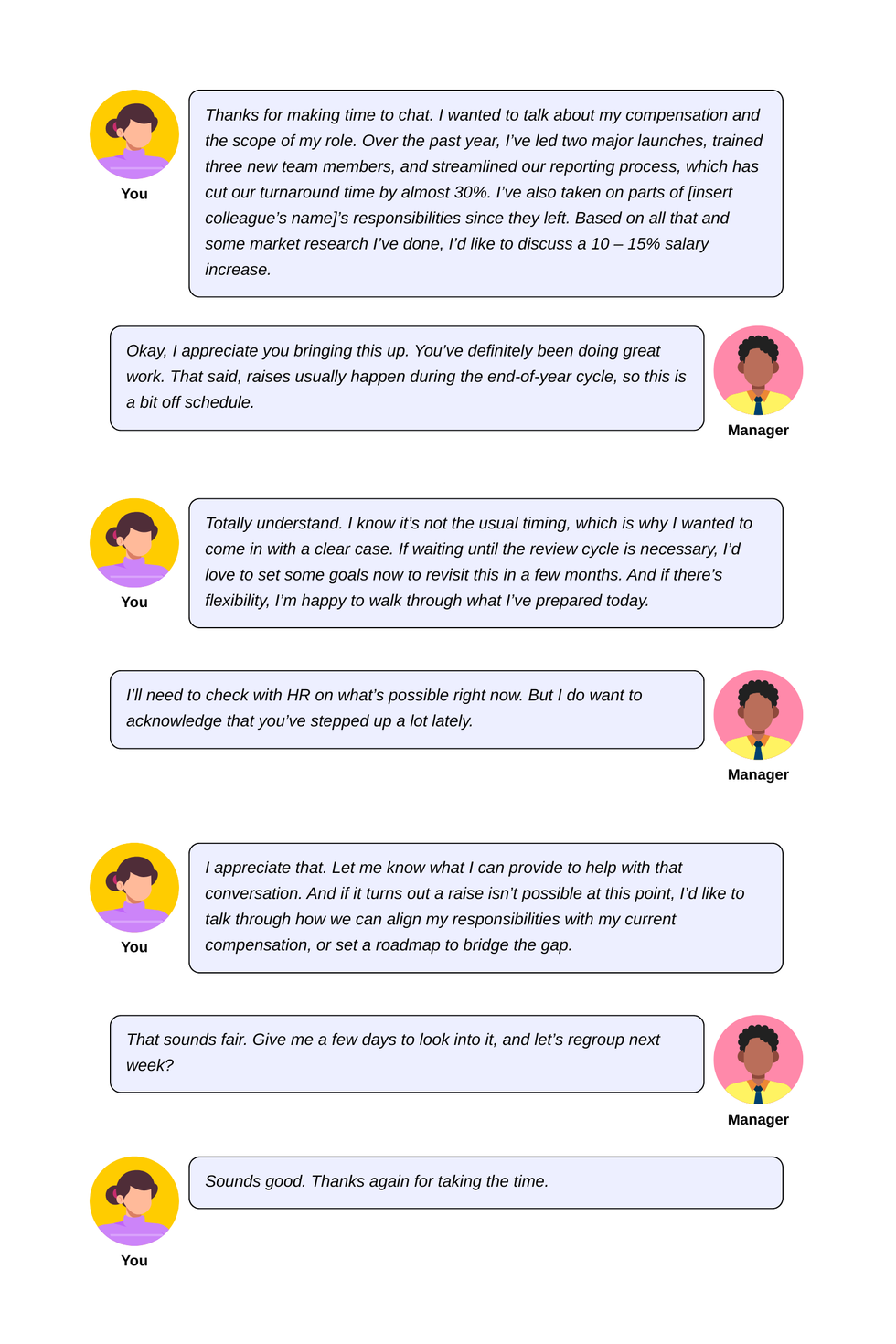Few things are more nerve-wracking than asking for a raise. Dental surgery, maybe. Public speaking (without a mic!). Telling your barber you actually do hate the haircut. But sitting across from your manager, heart beating out of your chest, trying to keep your voice from cracking while you ask to be paid more money? That’s its own special brand of psychological gymnastics.
You rehearse the whole thing in your head, in the shower, in bed trying to fall asleep, on your morning commute. You imagine your boss saying, “Wow, you're right! We've been underpaying you this whole time. Here's a 20% bump and a standing ovation.” But instead, you’re sweating through your shirt, wondering if your boss will find ‘how to ask for a raise’ in your Google search history.
Asking for a raise is not some radical act of rebellion, we promise. It’s not rude or greedy. It’s literally part of the deal. You show up, do good work, and when you’ve earned it, you ask to be compensated accordingly.
But just because it’s normal doesn’t mean it’s easy. That’s where this blog comes in. We’re walking you through the when, the how, the what if they say no, and even the “wait, should I just quit and become a goat farmer?” spiral. (Spoiler: probably not, unless you're like, really into goats.)
So, shake off the self-doubt. It’s time to break down how to ask for a raise — with confidence, with strategy, and without breaking into a cold sweat. Mostly.
When to ask for a raise (without it being weird)
Timing a raise request is a bit like trying to merge onto a busy highway. Do it too early, and you’ll get honked at; do it too late, and you'll miss your window. Hit it just right, though, and suddenly everything just... flows.
Technically, you can ask for a raise whenever you want. But if you want the answer to be “yes,” you’ll need to play it smarter than that.
🎯 Let’s start with the golden windows for when to ask for a raise:
- Right after a big win. You launched the project. You saved the company money. You led the team through chaos and somehow made it look easy — this is a great time to bring it a raise.
- When your role has grown. If you're doing more than what you were hired to do (and especially if you're doing work at the next level up), you’ve earned a conversation.
- During your performance review. Raises are often tied to formal reviews. If yours is coming up, start preparing now.
- At the start of a new fiscal year or budget cycle. That’s when decision-makers are planning how to spend money, so be part of that plan.
Watch this next: 30 Days to a Raise - How to Utilize End of Year Reviews to Negotiate a Promotion
If you’re asking for a raise off-cycle (as in, not during a review period or typical raise season), you’ll probably need some additional leverage. That can come from internal achievements (clear, measurable wins) or external validation (like another job offer that proves your market value).
Off-cycle raises aren’t impossible, but you’ve got to give them a reason to break the norm (no pressure). We’ll dive deeper into how to do that in just a moment.
❌ And then, there are the “maybe don’t ask” moments:
- When the company just had layoffs. Read the room. If leadership is busy figuring out how to keep the lights on, your raise request will probably land like a lead balloon.
- When your boss is in crisis mode and running on caffeine and vibes. If they’re dodging meetings and answering emails with one-word replies, it’s not the time.
- When you’ve only been in the role for two months. Even if you’re crushing it, you need a track record.
- When you’ve got no leverage and no wins to show for it, just vibes of your own. You might feel underpaid, but feelings aren’t currency.
Now here’s a spicy take: Even if you’re not planning to leave your job, you should still apply to other gigs and interview at least twice a year. This isn’t meant to be a shady strategy, but rather so you’ll know your value (and practice interviewing, a useful skill).
Interviewing helps you understand what the market is offering, what other companies are paying for your skill set, and whether your current paycheck is keeping up. It also gives you leverage. If your company wants to keep you, they’ll need to match that value, or at least come close enough to make it worth your while.
Because a raise request backed by solid wins and a shiny offer letter? That’s not just a request. That’s a business case.
How to find the confidence
I know, this might be the hardest part.
Even if the timing feels right for a raise, the little voice in your head starts whispering nonsense like, “What if they say no? What if they think I’m ungrateful? What if I forget how to speak mid-sentence?”
That voice is lying. Loudly. But it’s still there, which is why confidence is your armor.
And don’t stress if you’re shaking in your boots right now. Confidence is built, not born. You don’t have to be the loudest voice in the room or someone who thrives on confrontation — that’s not confidence. You just have to believe your work has value and back that belief up with preparation.
Start small. Track your wins. Keep a running list of the times you saved a project, made something more efficient, or turned a chaotic situation into something resembling order.
Practice your pitch. Seriously. Say it out loud. Say it to your mirror. Say it to your dog. (Bonus points if the dog tilts their head approvingly.) The more you hear yourself making the case, the less scary it sounds.
Remind yourself: you’re not being dramatic. You’re not being pushy. You’re advocating for your worth, and that’s a skill, not a personality flaw.
My dad always used to say, “You already have the ‘no.’” Translation? Your current situation is already the worst-case scenario, i.e., you don’t get a raise. So why not ask?
Confidence doesn’t mean you’re not nervous. It just means you do it despite the nerves.
Go get ‘em, tiger.
Watch this next: Are You Nervous to Negotiate a Higher Salary? Follow These Tips and Learn How to Do It!
What to prepare before the ask
It’s time to supplement that confidence with data.
The best raise requests come with receipts — proof that you’ve earned it and a plan for where you’re going next.
Before you schedule the meeting, pull together a few key pieces. This is your prep work. Think of it like building your case in a courtroom, except the jury is your boss and you’re arguing for a fatter paycheck.
Benchmark your salary
Start by figuring out what your role is worth, ideally in your industry and/or area. Not just in theory, but in cold, hard numbers.
Use tools like Glassdoor, Payscale, or Levels.fyi. Filter by title, industry, company size, and location. If you’re remote, look at national averages or what similar companies are paying. If you’ve got friends in the industry who’ll talk real numbers over coffee, even better.
This data should tell you whether you’re being underpaid, or if you’re on track and are ready for a standard bump based on performance.
Quantify your achievements
Next, collect the highlights. What have you done lately that moved the needle? Think impact:
- Projects you led
- Money or time you saved
- Processes you improved
- Clients you wowed
- Chaos you tamed
Bonus points if you can tie your work directly to revenue or results. It’s harder to argue with, “I brought in $200K in new business,” than, “I feel like I’m doing a lot.”
Read this next: Salary negotiation tips for remote workers
Build that business case
This isn’t just a review of your work history at your current role, either. It’s a pitch for the future. Include your recent wins and what you plan to tackle next. Got a big initiative on your plate? Mention it. Planning to upskill in a new tool or area? That counts, too!
Ultimately, you’re demonstrating why investing in you is good for the business.
Know what you’re asking for
Don’t dance around it. Go in with a specific number or percentage. For example: “I’d like to discuss a 10 – 15% salary increase based on the expanded scope of my role and the impact I’ve had over the last 12 months.”
Set a clear expectation; don’t just toss out a vague request and hope for the best.
If you’ve been doing extra work for months (think overtime, stretch projects, filling in gaps), bring that up too. It shows sustained effort.
Watch this next: How to Negotiate More Money & Increase Your Income
How to ask for a raise (i.e. the convo)
Okay, so you’ve done the prep. You’ve hyped yourself up, you’ve rehearsed your talking points so many times you could deliver them in your sleep. Now comes the actual conversation, which is somehow both terrifying and kind of thrilling.
First rule? Don’t ambush your boss. No one likes a surprise raise request sandwiched between a budget review and a 1:1 about Q3 metrics. Instead, ask to schedule a meeting. Keep it casual: “Hey, I’d love to set up some time to talk about my role and compensation. Would next week work for you?”
This gives them a heads-up and a chance to prepare (or at least not be caught totally off guard).
When the meeting rolls around, lead with your impact. Not your feelings. Not your rent. Just the facts:
- The work you’ve done
- The wins you’ve had
- The increased responsibilities you’ve taken on
Then, make your ask. Clearly. Calmly. Without rambling or apologizing.
Something like: “Over the past year, I’ve taken on XYZ, delivered ABC results, and contributed to [insert measurable outcome]. Based on that and my market research, I’d like to discuss a 10 – 15% salary increase.”
Then — and this is important — stop talking.
Let them process. Fight the urge to fill the silence with nervous babble about your grocery bills or how much you “love being part of the team.” This isn’t a hostage negotiation. Remember — you’re already living the ‘no’ scenario where your salary remains the same. You’ve made your case; now let them make theirs.
And if the conversation gets uncomfortable? That’s okay. A little discomfort is the price of growth and, hopefully, a bigger paycheck.
What comes next: If they say “yes,” “no,” or “maybe later”
Alright, you’ve said the number out loud without breaking into interpretive sweat-dancing. So... what now?
Well, it depends on how they respond. Let’s break it down.
👍 If they say yes
First of all, congrats! (Insert happy dance.) That awkward conversation just paid off… literally.
Here’s what to do next:
- Ask about timing. When will the new pay rate kick in? Will it show up in your next paycheck?
- Get it in writing. Email is fine. You don’t need a scroll sealed with wax, just a quick confirmation of the new salary and start date.
- Say thanks without turning it into a TED Talk. You earned this! Be gracious, not gushy.
🗓️ If they say “not right now”
This is the corporate version of it’s not you, it’s timing. Could be budget constraints, internal policy, or that your boss wants to give you a raise but doesn’t have the power to make it happen today.
Your next move? “What would I need to do over the next three to six months to move toward a raise?”
Push for specific, measurable goals — not vague promises like “keep doing what you’re doing.” Then ask to set a follow-up date to revisit the conversation. If they’re serious, they’ll put something on the calendar.
Also? Write it down. Send a follow-up email recapping the conversation so there’s a paper trail.
👎 If they say no… and mean it
Okay. Ouch. But not the end of the world.
You’ve still got options:
- Ask how to adjust your workload so it matches your current pay. If the raise is off the table, the extra responsibilities might need to be, too.
- Start looking elsewhere. If the company isn’t willing (or able) to pay you what you're worth, it may be time to find one that will. No hard feelings, just business.
Either way, you leave with more clarity than you started with. That’s a win.
TL;DR
Asking for a raise will never feel like a beach vacation. It’s uncomfortable. It requires guts. But it’s also one of the most important career skills you can build.
You deserve to be paid fairly for the work you do, and nobody’s going to make that case for you. Not your boss, not the HR gods, just you.
So choose your timing, gather your receipts, and practice your pitch. Then, when the moment comes, speak up!
Worst case? You get clarity. Best case? You get the raise. Either way, you walk away knowing you advocated for yourself — and that’s always worth it.








